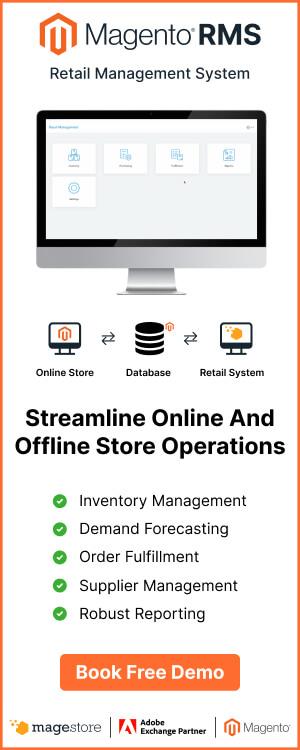The role of ERP in supply chain management is the efficient management of supply and demand through handling supply aspects (storage and transportation) and market aspects. For businesses at scale, ERP adds value to the entire supply chain, starting from raw material procurement to product delivery to customers. Meanwhile, SME retailers can choose a flexible ERP solution like Magento ERP to integrate 3 main flows: material flow, information flow, and financial flow. As a result, you can achieve operational efficiency, improve productivity, grow profit, and adapt to changes. So, what is ERP in supply chain and its roles for retailers? Read on to find out!
What is a supply chain planning system?

Supply chain management (SCM) includes planning, executing, controlling, and monitoring supply activities from procuring raw materials to delivering the product to customers. A supply chain management system provides a match between supply and demand to make the greatest ROI. There are 3 main flows in the SCM:
- Material flow: The product movement from suppliers to customers and product movement from customers to suppliers in case of maintenance and repair
- Information flow: The ability to track orders and delivery progress
- Financial flow: The credit terms, invoices, and other ownership agreements. This flow requires the highest level of cooperation between the members of the supply chain.
Thus, the role of supply chain management is enhancing cooperation and trust among supply chain partners, including suppliers, manufacturers, distributors, retailers, and customers. So, it plays an essential part in the overall success of a retailer. However, according to the 2021’s state of manufacturing report, 97% of retailers admit supply chain management consumes a significant amount of their time. Supply chain management is a long and cumbersome process if you don’t manage it effectively. It limits productivity, causes delays, affects service quality, and leads to unnecessary costs and lost profits.
So, the next section will discuss how ERP in supply chain management can simplify and optimize your supply chain management process for more profitable results.
What is ERP in supply chain?

ERP in the supply chain creates and executes a more efficient SCM process. As previously mentioned, the cross-departmental and multi-organizational nature of the supply chain makes it difficult for retailers to manage SCM effectively. However, an ERP system performs all the business functions such as human resources, finance, and accounting so you can easily access centralized information such as finance, logistics, sales, manufacturing, and distribution. As a result, ERP and SCM integration helps you deliver your products and services to customers with incredible speed, efficiency, and overall quality.
Thus, the benefits of ERP in supply chain management are:
- Consolidate supply chain operations in a single dashboard
- Provide more streamlined visibility and coordination with suppliers
- Automate supply chain processes to improve productivity
- Eliminate human error and data entry
- Provide valuable reports to make sound decisions
Role of ERP in supply chain management

The role of ERP in the supply chain is to streamline SCM operations for retailers. In addition, ERP addresses the multifaceted challenges of managing complex and constantly changing global supply chains, including production planning, warehouse management, and cross-border trade compliance. Below are 6 key roles of combining supply chain management and ERP:
1. Supply chain planning
ERP provides a more accessible and flexible way to set and change the supply chain’s parameters in supply chain planning, including:
- Determining required stock and inventory levels
- Optimizing warehouse resource management and automating inventory handling
- Creating efficient work schedules
- Ensuring replenishment can keep up with demand
- Planning product delivery date
As a result, ERP vs SCM in combination ensures that production matches demand and makes just-in-time replenishment.
2. Purchase, procurement, and fulfillment

ERP in supply chain management provides a more efficient way to handle the procurement and delivery of goods and services in the supply chain. From purchasing to order fulfillment, ERP systems provide cross-platform visibility across all aspects of the supply chain. As the market expands and globalization becomes more intense, the connection of ERP vs SCM provides a more efficient way to manage service procurement by:
- Automating communication with suppliers
- Managing fulfillment processes
- Eliminating errors caused by manual work
With the help of ERP, retailers can resolve resource conflicts in a supply chain task list.
3. Inventory management

Inventory management is the top concern of omnichannel retailers. An inventory error can disrupt the entire supply chain, cause delays, and make customers dissatisfied. Furthermore, the accumulation of excess inventory increases inventory holding costs and wastes warehouse space. Thus, integrating ERP into SCM provides cross-platform access to online to offline inventory information to maintain lean inventory. For example, supply chain supervisors can know precisely what production line resources are being used and for which shipment in real time.
In addition, integrated ERP and SCM solutions enable retailers to manage supply and demand better with more accurate forecasting.
4. Delivery and customer service

When shipping products, ERP also determines the most suitable packaging method and specifies the criteria for quality control. Furthermore, the ERP system maintains a central repository for customer shipments and all delivery details. You can:
- Log and track shipping processes
- Update and store all this information automatically
Furthermore, your employees and customers can easily track orders and deliveries. For example, ERP automatically generates and sends an invoice to the customer when shipping an order. ERP in supply chain management facilitates more flexibility and personalization in customer experience. It includes the production of made-to-order and configurable products. Integrated ERP and SCM solutions lead to faster production of higher quality products and customer service. It means improving on-time delivery, strengthening customer loyalty, and ultimately leading to repeat orders.
5. Measurement and evaluation

For retailers who use multiple independent systems and workflows for supply chains, it may be impossible to compare actual performance to goals and targets. Thus, you can benefit from ERP and SCM integration as it provides cross-platform access to inventory, financial, and manufacturing information. ERP systems provide superior information organization and aggregation capabilities to ensure that you can quickly identify and resolve any unexpected discrepancies throughout the supply chain.
In addition, the information gathered from the ERP system gives you a macro view to build a more effective SCM process.
6. Monitoring and maintenance

According to Allied Market Research:
- The post-COVID-19’s ERP market size increases from $44.737 million in 2020 and is expected to reach $86.303.00 million by 2027.
- The CAGR of the global ERP market is 9.8%, which is higher than before COVID-19.
The pandemic has forced retailers across the globe to move physical offices to remote working facilities, so the demand for ERP software has skyrocketed. Facing disruption and uncertainty, retailers are increasingly eager to improve supply chain transparency and implement more efficient resource planning. Supply chain management and ERP are essential to ensuring your business can maintain its flexibility to stay competitive and ensure cost-effective operation. ERP can help you reduce the impact of unforeseen events by offering the ability to monitor, review, and change supply chain efforts and operations in real-time.
Final thoughts
Supply chain management is a cumbersome and challenging process for any retailer as you need to adjust your activity to ensure responsiveness. ERP solutions consolidate all activities into a single dashboard instead of managing SCM and other business operations on separate systems. In addition, the role of ERP in supply chain management is to achieve operational efficiency by automating the SCM process. From resource management to sales, ERP streamlines supply chain management by integrating workflows, finance, and information for your long-term business success.
















